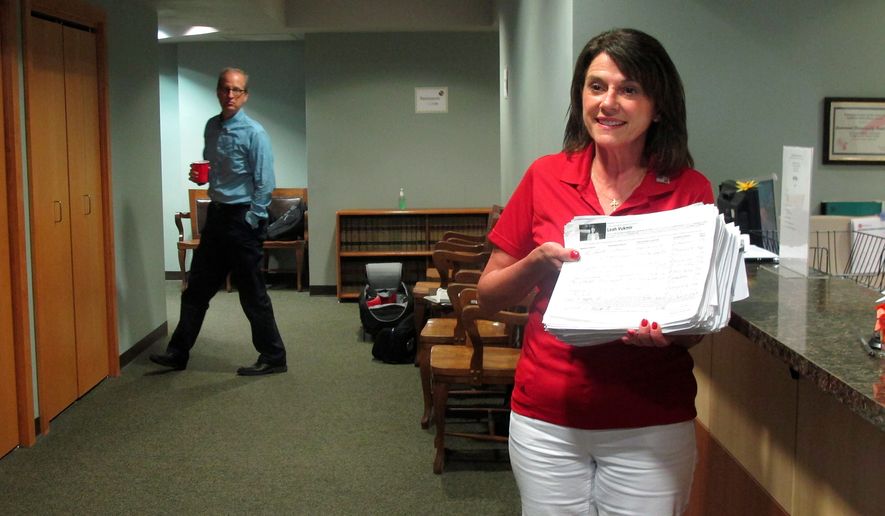The Republican Party has had a grim August, one filled with indictments, guilty pleas, courtroom convictions, gloomy prognosticators and a potential midterm disaster. So why are some party officials smiling? Polls.
The latest numbers in a handful of Senate races seem to indicate brighter prospects for Republican candidates against Democratic incumbents in the November midterm elections.
In New Jersey, the Republican nominee appears to have trimmed Sen. Robert Menendez’s lead in what seemed to be a long-shot race. In Wisconsin, where a primary just provided clarity on who will be on the ballot, the Republican appears to be rallying behind its pick in the race against Sen. Tammy Baldwin.
In Florida, where Gov. Rick Scott has held the Republican nomination for several months, he appears to have taken a slim but unmistakable lead over longtime incumbent Sen. Bill Nelson.
“I think there’s a disconnect between handicappers in D.C. who just look at the numbers and don’t see what’s happening on the ground and those of us who do see what’s happening on the ground,” Republican National Committee spokesman Rick Gorka said.
Elections analysts, though, say Republicans are still facing massive headwinds, particularly in races for governorships and seats in the House.
There, the news looks bleak for Republicans.
The Cook Political Report moved two House seats from solid Republican holds to competitive races, including that of Rep. Duncan Hunter of California. Mr. Hunter and his wife were indicted last week, and he became the second Republican federal lawmaker so targeted in the late summer of a midterm election year. Rep. Chris Collins of New York also was indicted this month.
That comes on top of a rash of Republican retirements this year.
“Republicans are coming to terms with the reality that the 2018 midterms are shaping up to be a train wreck,” Mr. Cook concluded. “It is an exaggeration to say that Republicans would need a miracle to retain their House majority, but that is certainly closer to being true than suggesting that House control is a 50-50 proposition.”
FiveThirtyEight, a website that uses complex analytics to prognosticate in political races, lists the chances that Democrats will gain a House majority at 72.4 percent. On the other hand, that is a slight drop from the 77.2 percent chance that the website put on a Democratic majority at the beginning of the month.
The Senate is somewhat better for Republicans, chiefly because of the playing field. Of the 33 seats up for election this year, 10 are in states Donald Trump won in 2016.
That includes Wisconsin, where Ms. Baldwin is in her first re-election campaign. She finds herself with just a 2-point edge over Republican challenger Leah Vukmir, according to a Marquette Law School poll that also gave Republican voters a fractional edge in enthusiasm.
In Florida, a new poll puts Mr. Scott up 6 points in his race to oust Mr. Nelson, who first won his seat in 2000. Although it is a broader gap than other polls, the survey continues a trend showing Mr. Scott gaining ground and then taking a lead.
New Jersey is a state Mr. Trump did not win, but Sen. Bob Menendez, a Democrat who beat a corruption case after a hung jury last year, remains saddled with a dubious image as he seeks a third term.
His lead over Republican challenger Bob Hugin has fallen from 17 points to 6, according to a Quinnipiac University poll. The unexpected margin, coupled with another new figure that showed Mr. Menendez 7 points under with voters in approval versus disapproval, prompted gleeful hand-rubbing inside the Republican Party.
Ron Faucheux, a former Louisiana politician turned Beltway analyst, called the Wisconsin numbers a welcome surprise for Republicans, although he thinks Mr. Hugin’s chances in the Garden State remain slim.
“The New Jersey situation is a case by itself because of Menendez’s legal problems,” he said. “There’s a significant portion of New Jersey voters who think he’s guilty of serious wrongdoing, and in a swing state it would clearly bring him down.”
But Mr. Hugin is in a Democratic stronghold, a state that last elected a Republican senator two years before President Nixon resigned.
Rather than attempt to draw conclusions about the overall trend, Mr. Faucheux said, the polls could prove telling on a “case-by-case basis.” While he believes Democrats will take the House, he said, a gain of 23 or 24 seats there hardly constitutes a landslide if Republicans hold or improve their Senate majority.
“Anybody right now can make the case for a ’blue wave’ or a ’red wave,’ but it’s way too early for that,” he said.
Feeding blue wave fever is polling in other Trump-won states such as Pennsylvania, where Sen. Robert P. Casey Jr., a Democrat, holds a massive lead over Republican challenger Rep. Lou Barletta, and in Indiana, where a poll gave incumbent Sen. Joe Donnelly a dozen-point lead over his Republican opponent.
In deep-red Texas, Republican Sen. Ted Cruz is holding only a 4 percentage point lead over Democratic challenger Rep. Beto O’Rourke in an NBC/Marist poll.
Mr. Cook, who was in Wisconsin last week, said August isn’t the time to draw firm conclusions about November’s elections.
For example, while the right direction/wrong direction figure for the country remains negative, Mr. Cook said that has been the case for so long that few political analysts pay much attention to it anymore. Polls that gauge a president’s approval during midterm elections and those with a generic Democratic/Republican preference are usually more telling, and those tea leaves still look bitter at the bottom of the Republicans’ cup.
Democrats, he noted, are at plus-7 on that rating.
Even there, however, Republicans have at least one poll to cheer them: On Aug. 22, Rasmussen had the generic congressional ballot dead even for the first time since early May. The Democrats’ 7-point lead evaporated in August.
• James Varney can be reached at jvarney@washingtontimes.com.




Please read our comment policy before commenting.